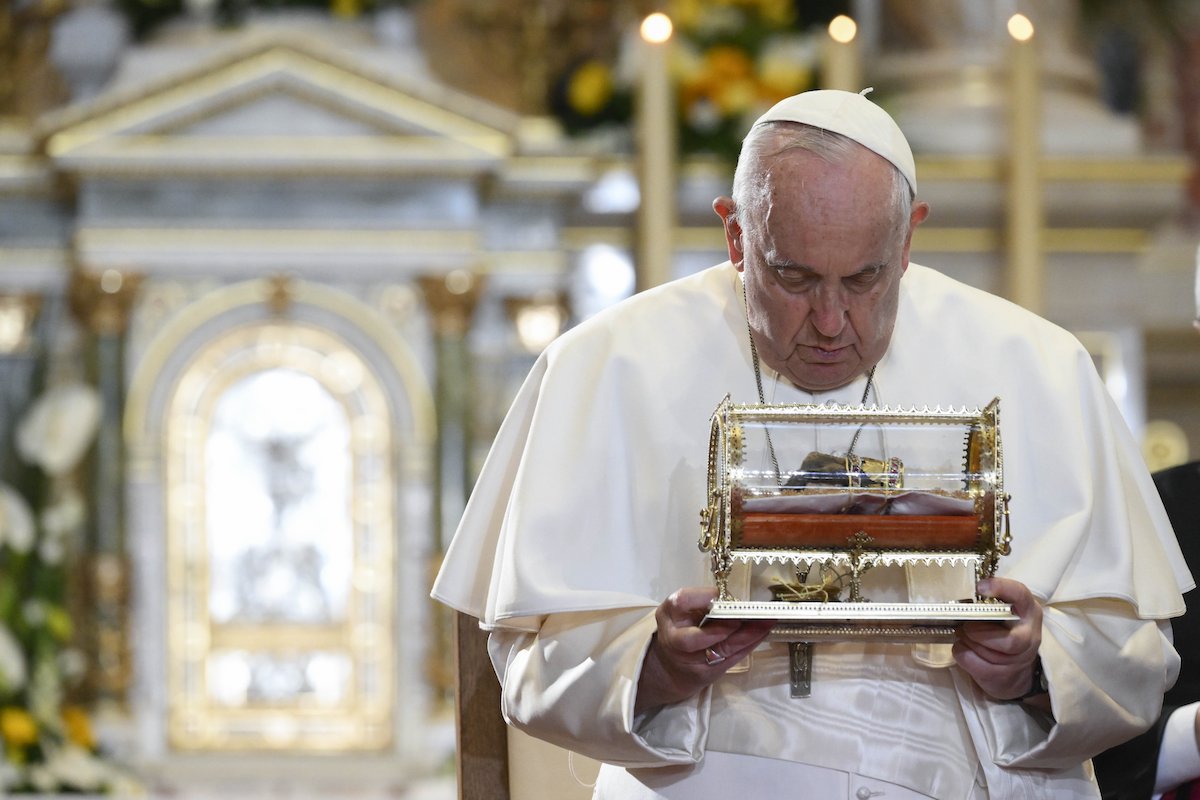By Cindy Wooden, Catholic News Service
BUDAPEST, Hungary (CNS) — The life of faith is not a game, but it does require commitment and training, Pope Francis told thousands of Hungarian young people gathered in a sports arena in Budapest.
“How do we win in life?” the pope asked the young people gathered in the capital’s László Papp Budapest Sports Arena April 29. Success has two basic steps, he said, “First, aim high, then train.”
Everyone has a talent, the pope said, but using it just to earn money or have fun will not bring happiness.
“Put your talents to good use,” he said. “Don’t be afraid.”
Listening to the deepest desires of one’s heart may reveal a longing to have a large family or to serve others and the church through priesthood or religious life. Even if society seems to treat those vocations as unreasonable, he said, they are not unattainable desires.
The first step in training for a full and happy life, he told more than 10,000 young people, is “dialogue with Jesus, who is the best of coaches. He listens to you, encourages you, believes in you and is able to bring out the best in you.”
“He constantly invites you to be a team player, never alone but with others: in the church, in the community, sharing your experiences with others” — in person, the pope said. Spending all of one’s time on the phone, interacting only with virtual friends, “is not good or healthy.”
A bit of silence each day also is needed, he said.
“Nowadays, we are bombarded with the message that we have to be fast, efficient and practically perfect, like machines,” he said. “Then we often find that we run out of gas and are at a loss for what to do. We have to learn how to stop and fill our tanks, to recharge our batteries.”
Prayer, reading the Bible, reading a book, enjoying nature — those are all things that are better with silence, he said.
Silence, the pope said, “is the door to prayer, and prayer is the door to love.”
Two young women and two young men briefly shared stories of their faith journeys with Pope Francis and with their peers.
Bertalan Krabót, 15, told Pope Francis that when he was younger, he did not see the point of Mass or confession and thought faith had little relevance to his life. “The saints are all up in heaven; they’ve won, they’ve finished their match, and I haven’t.”
But as he grew and became involved in a group for altar servers and another for Catholic scouts, he said he started to see that he could be a normal teenager and still serve God and his community.
“Jesus died on the cross not just for geniuses and Olympic medalists,” he told his peers. Jesus “infinitely loves every person, including me,” and has a plan for every life.
In fact, the pope noted, “on every page, the Gospel tells us that the Lord does not do great things with exceptional people, but with ordinary people.”
Tódor Levcsenkó, a 17-year-old student in Miskolc, Hungary, and the son of an Eastern Catholic priest from the Eparchy of Mukachevo in Western Ukraine, told his peers that their sense of mission and purpose can be “numbed by the fact that we live in safety and peace,” but only a few miles away, across the border, “war and suffering are the order of the day.”
“May we have the courage to defend our faith and take up our call to be peacemakers,” he said.
Pope Francis echoed his call, telling the young people, “This is the real challenge: to take control of our lives in order to help our world live in peace. Each one of us should ask the uncomfortable question: What am I doing for others, for the church, for society? Do I think only about myself?”







